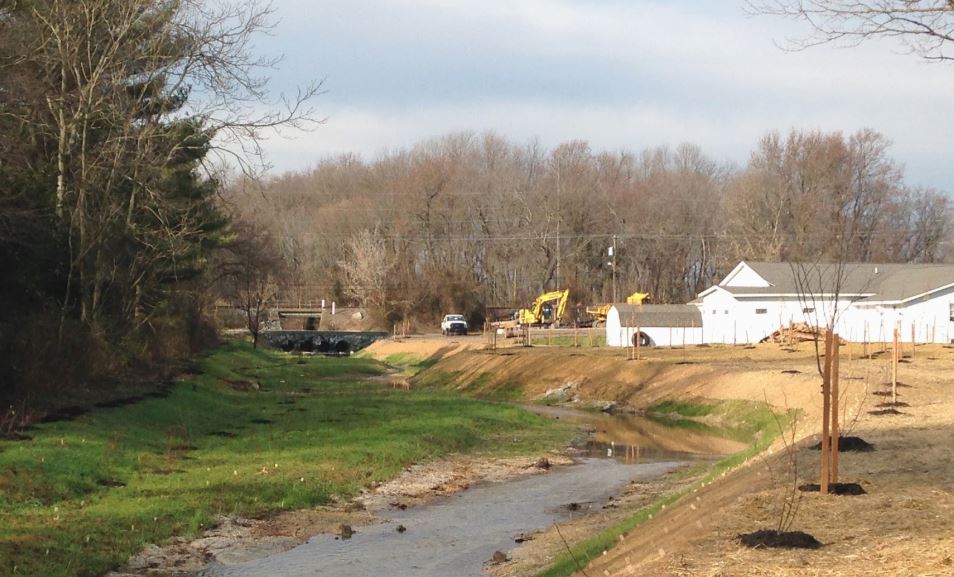DNREC provides administrative and technical assistance and support to tax ditch organizations and landowners across the State.
Drainage Program
302-855-1930
Report Tax Ditch
Drainage Concerns
302-855-1955
A tax ditch is a governmental subdivision of the State formed by a prescribed legal process in Superior Court to oversee drainage of a specific watershed area. A tax ditch organization is made up of all landowners (also referred to as taxables) of a particular watershed or sub-watershed.
The operations of a tax ditch organization are overseen by ditch managers and a secretary/treasurer. These officers are landowners within the watershed and are elected at an annual meeting of the taxables.
Delaware has 234 individual tax ditch organizations, ranging in size from 56,000 acres (The Marshyhope Creek Tax Ditch in west central Delaware) to a two-acre system in Wilmington. These organizations manage over 2,000 miles of channels and provide benefits to over 100,000 people and almost one-half of the state-maintained roads.
Tax ditch channels range in size from six to 80 feet wide and two to 14 feet deep. The dimensions depend on the acreage being drained and the topography.
Tax ditches were created for and designed to move normal water flows off agricultural lands to keep them productive. Under heavy rain conditions tax ditches may have water over-top their banks onto adjacent lands for short periods of time.
Each tax ditch has a right-of-way (ROW) on one or both sides of the ditch. This type of easement is used to access the ditch for maintenance and disposal of the sediment and debris from the channel during cleanout. No permanent structures — homes, sheds, wells, ponds etc. — are permitted in the tax ditch right-of-way.
DNREC provides an online application using county parcel data to generate a formal letter with tax ditch right-of-way information for a parcel.
Any landowner that has a right-of-way on their property can request a change to it. To do so they must be the current landowner and contact the Tax Ditch Program to begin the legal process of a Court Order Change (COC) (county fees apply). They must provide:
Please use this form to submit any tax ditch change requests.
DNREC Provides guidance for landowners and contractors with tax ditch right-of-ways on their property to help avoid common problems with driveways, fencing, wells and septic systems.

Maintenance of a tax ditch is determined by the tax ditch organization and the funds available to it. For an organization to spend funds it must have active officers.
Maintenance operations include mowing of the tax ditch right-of-way and removal of beaver dams or accumulated sediments from the channel bottom, commonly referred to as “dipouts.”
The Tax Ditch Program offers assistance in reviewing residential and development plans to ensure that they comply with tax ditch law and recommends minimum design specifications for tax ditch features. All development should stay out of the right-of-way and tax ditch channel, and any proposed changes must allow for the access of large equipment and maintenance of the ditch. Please see this document for general guidance on developing lands in relation to tax ditch watersheds.
To request this assistance, please fill out the Tax Ditch Land Development Project Review Request and provide site plans that:
Are you a tax ditch landowner? You can volunteer to be an officer and help support these valuable systems. They cannot work without you. You can prioritize maintenance needs, sign-off on any changes, and add running a sub-division of the Delaware government to your resume.
Find more information on tax ditch officer positions in the state’s Tax Ditch Law or contact the Tax Ditch Program at 302-855-1930 or by email, for more information.
Tax Ditch Permitting Assistance Request Form
Landowner Maintenance Responsibilities
Maintenance Contractor Submission Form
Tax Ditch Officer Notice of Resignation
Related Topics: conservation, drainage, flooding, stormwater, tax ditch, watershed